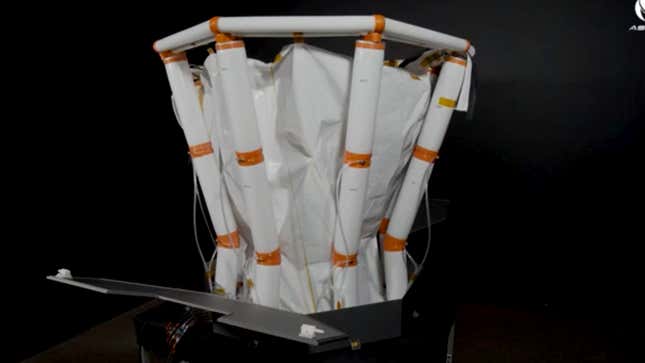
Picking up the trash in space could be as easy as stuffing pieces of defunct spacecraft into a giant bag, closing it up, and tossing the pesky space junk into an orbital recycling plant. At least that’s what space startup TransAstra hopes to do with its inflatable capture bag.
NASA recently awarded the California-based company a $850,000 early-stage contract to build its inflatable space junk bag and demonstrate its technology on the ground, SpaceNews reported.
Advertisement
The capture bag was originally invented for the Asteroid Redirect Mission, which was designed to rendezvous with a near-Earth asteroid and collect a multi-ton boulder from its surface. Although the original concept was meant for asteroid mining in low Earth orbit, TransAstra soon realized that its inflatable bags could also work for cleaning up orbital junk.
More than 27,000 pieces of orbital debris are currently being tracked by the Department of Defense’s global Space Surveillance Network, with lots of smaller pieces also floating around undetected. That number is only going to increase as the global space industry continues to grow, with more spacecraft being launched to low Earth orbit. In fact, things have gotten so bad that the target of an upcoming space junk removal mission was struck by another piece of space junk before the giant claw could clean it up.
Advertisement
Advertisement
TransAstra hopes to deploy its capture bag to orbit, where it is designed to inflate and collect several pieces of orbital debris like a space Pac-Man, while connected to a space tug named the Worker Bee. The bag would then transport its collection of space junk to an in-orbit recycling plant, the ThinkPlatform.
“Repeated trips to pick up orbital debris and transport it to Earth’s atmosphere for disposal require significant propellant and time,” Nicole Shumaker, TransAstra vice president of strategic partnerships, is quoted in SpaceNews as saying. “Recycling stations in space resolve this problem and transform what was previously a liability into an asset that not only mitigates orbital debris but opens up new possibilities for in-space manufacturing and construction.”
For more spaceflight in your life, follow us on Twitter and bookmark Gizmodo’s dedicated Spaceflight page.
Services Marketplace – Listings, Bookings & Reviews